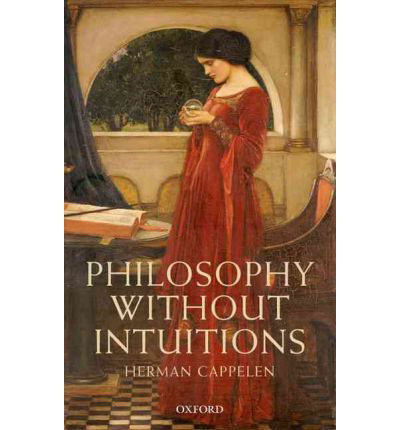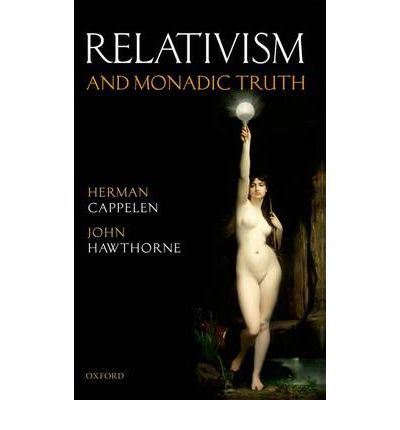No intuitions no relativism
Herman Cappeleninterviewed by Richard Marshall.
Herman Cappelenis mounting a fierce defence of his armchair against the crazyist gang over at X-phi - although he doesn't want his counter-attack to be just about X-phi. He expects it to run and run. He writes about when language talks about language. He thinks analytic relativism a mistake and that truth is monadic. He thinks talk of possible worlds is the path to many errors. He thinks Kripke original, deep and almost entirely true. He thinks Lewis original deep and almost entirely false (but dangerously seductive because his errors are hidden). All in all this is one groovaciously pugnacious philosophical dude.
3:AM:What made you become a philosopher? Was it something you always felt affinities with, or was it something you came to from elsewhere?
Herman Cappelen:I’ve always felt an affinity with philosophy. Put a bit pretentiously, philosophers think deeper and wider than anyone else and that’s intellectually liberating, satisfying, and of course endlessly frustrating at the same time. When thinking philosophically comes natural to you, then what’s puzzling and slightly bizarre is to not do philosophy. Whatever topic you’re thinking about, you’re never more than two to three ‘Why?’s away from a philosophical question. I’m always puzzled when someone lacks the curiosity to ask those two to three why-questions. Anyone who’s intellectually curious will care about the foundations of what they’re doing and those foundations are invariably, in part, philosophical. So I’m one of those who don’t think philosophising requires much of an explanation, excuse, or justification – lack of philosophical curiosity always strikes me as a pretty reliable sign of intellectual shallowness.
I was also lucky to be around good philosophers while growing up. As a teenager in Norway, Arne Naesswas an inspiring role model and as an undergraduate at Balliol in Oxford, I had Jonathan Barnesas tutor for most of my courses. Barneswas an important influence - though I remember asking him whether it was worth going on with philosophy professionally and he said, ‘Only if there’s absolutely nothing else you can see yourself doing and you think you can do it better than anyone else’. I worked hard to ignore that advice or put severe restrictions on the domain of ‘anyone.’ That said, I think he was right. However much one loves doing philosophy, entering into the profession is for most lovers of philosophy probably a bad choice (which is just an instance of a more general point: making a profession out of something one loves because one loves it, is probably a bad choice).
3:AM:Your latest book, Philosophy without Intuitions, enters a hot debatein philosophy, that of the role of intuitions. Philosophers alleged reliance on intuitions has been source of concern. This concern is unwarranted?

HC:Right. Not because reliance on intuitions is unproblematic, but because philosophers don’t rely on intuitions. It turns out that those who assumed philosophy was intuition-based hadn’t done their homework: they made broad, sweeping claims about an activity (philosophising) and a group of people (philosophers) without careful study of those people and that activity. When you look at what real – as opposed to caricatured - philosophers write (and say), there’s nothing there that is appropriately characterised as ‘relying on intuitions as evidence’.
Those who think philosophers rely on intuitions disagree widely in what they mean by ‘rely’ and ‘intuitions’ – so the received view is anyway obscure. In the book I identify three key features that philosophical intuitions is alleged to have: a distinctive phenomenology, a reliance on nothing but conceptual competence, and a special status (they justify, but are not themselves in need of justification). I then look in detail at paradigms of philosophical thought experiments where such judgments are supposed to figure centrally, and it turns out that intuitive judgments, so conceived, do not play a role. So the whole picture of philosophy as intuition-based is simply a misdescription of what philosophy is and what philosophers do.
I’m quite passionate about this since the picture of philosophy as resting on unquestioned intuitions, snap judgments endorsed unquestioningly, etc. is such a depressing misconception of what we are doing. One of the most characteristic features of us philosophers is that we question everything and are willing to (try to) provide reasons for everything. In philosophy, nothing has the kind of status intuitions are mistakenly described as having. That’s just not the kind of activity philosophy is.
3:AM:Why do you think that philosophers have been falsely charged with over-reliance on intuitions?
HC:How this false self-conception became prominent is a very interesting historical question that I don’t have a satisfying answer to. You see claims about philosophical reliance on intuitions become widespread in the late 80s and early 90s. It’s interesting to contrast this period with the earlier parts of the 20th Century. The view that intuitions are the foundation of philosophy would be alien to more or less all those we think of as the leading thinkers of the 20th Century. It played no role in Frege, Wittgenstein, Russell, Carnap, the logical positivists, Quine, Davidson – whomever you take to be your favourite philosopher prior to 1980 didn’t have this false belief about philosophy.
How the misconception became so widespread so fast is a bit of a mystery. In the first chapter of the book, I consider a few theories, but no one of them strikes me as entirely satisfying. I think one important factor is what I call the ‘verbal virus’: at some point in the 70s some influential philosophers starting using terms like “intuitively, blah…” a lot, and somehow the use of those terms spread - it became a fashionable way to speak. The use of those terms made some people think that they were relying on intuitions as evidence. The entire first part of the book is a careful study at the use of such terminology in philosophy. I show that they are for the most part used as devices of hedging and never used to refer to a source of evidence. Now, why people started saying things like ‘intuitively blah…’ in the 70s and 80s I’m not sure. I consider a few explanations in the book, but none of them very satisfying. No matter what the explanation, what started as an innocent terminological fashion has had very unfortunate effects on the profession.
3:AM:X-phiin particular has spent a lot of effort examining intuitions because they thought they did play a huge role in philosophical thinking – so have they been wasting their time? Did all those armchairsperish in vain?
HC:Yes, a complete waste of time. Philosophers don’t rely on intuitions when they philosophise so the project of studying intuitions isn’t relevant to anything we’re doing. But X-phiis worse than that: the movementhas had very negative and paradoxical effects. It started out as a movement critical of what they took to be philosophers’ reliance on intuitions. So they attacked a non-existing practice. However, the popularity of that movement is today responsible for people starting to pay attention to intuitions in a way they never did before – they are in effect creating the practice they set out to destroy. Every time an experimental philosopher(or one of their fellow travelers) engage in X-phi, they make it true that a philosopher appeals to intuitions when doing philosophy. So they are the exception to the rule: they are the (only) philosophers who rely on intuitions when they philosophise. So the more of those we have in the profession, the more the profession changes into one in which intuitions (of the worse kind) play a role. Exactly the opposite of the goal e.g. Stephen Stich had when he started the movement.
3:AM:You’re a big player in contemporary debates about the role of context in meaning. You defend two positions that aren’t usually put together: semantic minimalism and speech act pluralism. Can you explain these positions?
HC:Anyone who studies the connections between language and context will observe that context shapes and determines what we say when we speak in a wide variety of ways. The contents we can express using language are tied in intimate and often surprising ways to the speech context. This observation raises questions about how people in very different contexts can express the same contents; how the same thoughts can be expressed in different contexts; how the same thoughts can be transmitted between contexts. This, for me, is the most fascinating and important question in philosophy of language: if contents are shaped in all kinds of ways by the contexts we are in, how do we communicate with, share information with, agree and disagree with those in different contexts? More or less all my work in this area has been an attempt to answer that question – what I think of as the question of shared content.
The combinationof semantic minimalismand speech act pluralism was an attempt to answer that question. Pluralism is the view that when we utter a sentence, we never express unique contents. We say lots and lots of things. That plurality of contents is influenced in all kinds of interesting ways by context. But the plurality has a stable core – I call it the 'minimal semantic content’. Minimal semantic content is invariant between contexts. So the view allows for both stability across contexts (in virtue of minimal contents) and contextual variability in the rest of the plurality.
3:AM:How can a speaker say many things by uttering one sentence? When I say something, haven’t I said just that one thing?
HC:As I see it, much of philosophy in the 20th Century (and, maybe, Western philosophy more generally) has been dominated by a form of content monism. According to this orthodoxy, to think a thought, e.g. the thought that Buenos Aires is further south than Rio de Janeiro, is to stand in a relation to a unique proposition. Similarly, to utter a sentence – say, “Buenos Aires is further south than Rio de Janeiro” – is to express a unique content. I think this orthodoxy is fundamentally wrong. I think that when you utter a sentence you express a very large number of distinct, but related contents. When you think a thought you think very large number of distinct thoughts. There’s never a unique content entertained. This is a view that takes getting used to, but once you take it onboard, it has a rather wide variety of interesting implications for many different aspects of our linguistic and cognitive lives.
3:AM:Another issue you’ve worked on is relativism about truth. Relativism used to be huge, then it got banished but now it has risen up in a form labeled ‘analytic relativism’, which draws on ideas coming out of foundational semantics. Can you say what this new kind of relativism claims and why it seems to be thriving better than the old style?
HC:This is an area where philosophy has made enormous progress in just twenty years. Anyone who thinks philosophy doesn’t make progress, even fast progress, should make an effort to understand this debate. For 2000 years, relativism has been a salient and controversial philosophical position. It is, speaking loosely, the view that what is true depends on the perspective of the assessor: something can be true for you and false for me. You think it is true that BLAH, I think that BLAH is false, and we can both be right. Until recently, this kind of view was typically summary dismissed by philosophers as either indefensible or incoherent, but about ten years ago, groundbreaking work by John MacFarlane, Max Kolbel, John Hawthorne, Andy Egan, Brian Weatherson and others provided new arguments for the position. Some of these arguments draw on contemporary work in linguistics and some of the arguments (the ones I find most interesting) rely on the same kinds of considerations that I used to motivate semantic minimalism: on the one hand, we want contents that can be shared across contextual variations (in particular, we want to explain how people can agree and disagree across contexts), on the other hand, we need to incorporate the role of context (the speaker’s preferences, beliefs, etc).

The relativists solve the problem in this way: they postulate a stable minimal content (in effect a form of semantic minimalism), and add that these contents are true or false relative to a contextually fixed parameter. So the contextual variability is incorporated into the assessment of truth and falsity, not into the content. The semantic content is stable (as it is in semantic minimalism) and what assessment context contributes affects truth assessments of that stable content. So relativism is a form of minimalism with the addition of a relativistic story about truth.
3:AM:You contest this new relativism and the theory of semantics that is its foundation don’t you? So what is your idea of ‘monadic truth’ that you defend as ‘simplicity’?
HC:In our book Relativism and Monadic Truth, John Hawthorne and l look in detail at the various proposals made by analytic relativists, and we find them lacking along many dimensions. The central criticism is this: an important motivation for analytic relativists comes from contemporary philosophers’ uncritical use of possible-worlds terminology. It is more or less commonplace these days to accept that what someone says can be true relative to this, the actual world, but false relative to some other possible world. When I say, “There are talking donkeys” what I say happens to be false relative to this world, but there are plenty of possible worlds relative to which what I say is true (all the possible worlds where there are talking donkeys).
This kind of ideology – talk of truth and falsity as world-relative – plays a big role in contemporary semantics, linguistics and also in other parts of philosophy. The relativists argue that this makes us all a little bit relativists and so we shouldn’t be surprised (or find it objectionable) to be told that truth is relative to parameters other than worlds, e.g. people’s preferences or their moral codes.
Hawthorne and I stop this line of thought at the very beginning. We argue for a view where truth is a monadic property – it is not a relation to anything. If Norwegians like fish, then the proposition Norwegians like fish is true. Full stop. Another way to put this: We take truth simpliciter to be fundamental, and talk of truth relative to some parameter x (e.g. a world) to be a derived notion. In this way we stop the relativists at the very beginning when they tell us that adoption of possible worlds semantics has already led us halfway down the road to relativism.
3:AM:This links up with your ideas about semantic minimalism doesn’t it, in particular the idea of fundamentality?
HC:It’s intimately connected since relativism, as I see it, is a form of semantic minimalism combined with some objectionable views about truth. If you agree with Hawthorne and me about the primacy of monadic truth, minimalism remains, as I see it, the best reply to the shared content problem.
3:AMAnd finally, for the budding philosophy of language freaks here at 3:AM, are there books or articles (other than your own which we’ll be dashing away to read straight after this) that you can recommend to take us deeper into your world?
HC:To get into issues in philosophy of language, one can never read Kripke’s Naming and Necessityenough. It’s written the way philosophy should be written: it’s clear, it has beautiful arguments, it’s original, it’s deep, and it’s almost entirely true. It’s just about as good as it gets. Other classics that one should spend a lot of time on include the work of Paul Grice, in particular his paper Logic and Conversation. I’m currently finishing a book focused in large part on the kinds of issues discussed by John Perry in his collection the Essential Indexical– that is very important and inspiring material. Much of my recent work also engages with some of David Lewis work, but I’m reluctant to suggest that as introductory reading. Lewis is a superb and seductive stylist, but his views are almost always very wrong and it takes hard work to see why. So, Lewis is dangerous reading.
In addition to such classics, there’s a lot of very recent material that’s extremely interesting. Take a look at the work of Deidre Wilson, John Hawthorne, Brian Weatherson, Robyn Carston, Jason Stanley, Francois Recanati, Andy Egan, John MacFarlane, Seth Yalcinand many, many others. There’s a huge amount of extremely interesting work being done right now – very little of it accessible to those unwilling to work hard, but well worth it for those who are willing to put in the hours.
 ABOUT THE INTERVIEWER
ABOUT THE INTERVIEWER
Richard Marshallis still biding his time.